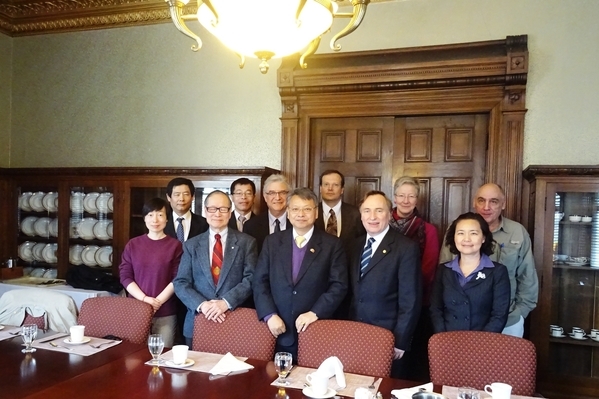The Chair of Taiwan Studies “ROC (Taiwan) and Canada Relations:Prospects & Opportunities” Held in McGill University

This year’s annual Taiwan Studies public lecture was presented by Bruce J.D. Linghu, the Representative at TECO at the Faculty Club Conference Centre at McGill University on April 24. His topic was “ROC (Taiwan) and Canada Relations: Prospects & Opportunities”. Prof. Philip Buckley, Chair of the Department of East Asian Studies at McGill University, and other professors and students attended the lecture, along with Cheng Cheng-Kie, Emily Wang, and Henry Lin from the TECO office.
Taiwan is Canada’s 12th largest trading partner in the world and its 5th largest trading partner in Asia. Canada is also a major supplier of resources to Taiwan. Bruce Linghu began his talk with a brief outline of Taiwan’s geography, culture, and economics. He then pointed out that the very friendly relationship between Taiwan and Canada has a solid foundation. As well as good trade relations, Taiwan and Canada have had many mutually beneficial exchanges in such fields as politics, education, air transportation, and science and technology. Taiwan hopes to continue strengthening Taiwan-Canada relations, by following the ADTA-FIPA-ECA-TPP path. These letters stand for: ADTA: Avoidance of Double Taxation Agreements; FIPA: Foreign Investment Protection Agreement; ECA: Export Credit Agency; and TPP: Transpacific Partnership Agreement.
He concluded by discussing how Taiwan is working to strengthen its influence on the world stage. This includes joining international organizations, developing free trade, and actively participating in issues without borders, including humanitarian medical aid, air safety, and global warming. At the same time, Taiwan hopes to continue playing an important role maintaining and sharing traditional culture, and also become a link between European and American countries and Asia. A Q and A session ended an interesting lecture.
